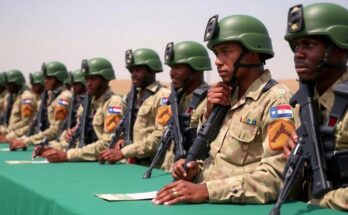In a statement, South Sudan’s Foreign Affairs Minister, Ramadhan Abdalla Mohammed Goc, discussed the progress and challenges in achieving lasting peace and political stability in the country. He indicated that resource scarcity hampers the full implementation of the Revitalized Agreement and called for international support. Goc also highlighted the humanitarian crisis induced by the Sudan conflict and urged for increased global cooperation in adaptation to climate change. He lamented the ongoing sanctions against South Sudan, advocating for their removal to foster sustainable peace and calling for Security Council reforms to better represent Africa.
Ramadhan Abdalla Mohammed Goc, the Minister for Foreign Affairs and International Cooperation of South Sudan, has articulated the ongoing challenges and progressive developments within his nation as it strives towards comprehensive peace and political stability. He emphasized that while substantial strides have been accomplished in implementing the Revitalized Agreement on the Resolution of Conflict in South Sudan, a notable scarcity of resources hinders its full realization. Minister Goc noted the commitment of all parties to the peace agreement, as evidenced by their recent consensus to extend general elections by 24 months. This extension aims to provide the necessary time for security sector mechanisms and related institutions to fulfill their responsibilities effectively. Moreover, he urged the international community to provide essential financial and technical support for the newly established roadmap aimed at facilitating a peaceful transition in South Sudan. In light of the Sudan conflict, which has led to an influx of over 800,000 refugees into South Sudan, he called upon global partners to enhance their support for Sudan and to take decisive action towards resolving the underlying conflict. Expanding upon the impact of climate change, Goc urged for intensified efforts in adaptation strategies on the African continent, appealing to developed nations to enhance their financial contributions to global mitigation and adaptation initiatives. Additionally, he outlined his government’s priorities, including the inclusion of women and youth, universal and affordable healthcare, and the transformation of education. He expressed concern regarding the existing Security Council sanctions and arms embargo imposed on South Sudan, describing them as significant barriers to attaining sustainable peace and security. Minister Goc remarked, “As a country, we have experienced relative peace and stability for the last six years, and the continued imposition of these punitive measures is not reflective of the progress we have made so far.” Furthermore, he advocated for reforms in the Security Council to align it with contemporary global dynamics and to better represent Africa’s interests.
The recent statement by Ramadhan Abdalla Mohammed Goc comes in a context where South Sudan is navigating complex political dynamics following years of conflict. The Revitalized Agreement on the Resolution of Conflict aims to establish a framework for peace and stability within the nation. However, the implementation of this agreement faces challenges, primarily due to a lack of funding and resources. The situation is further complicated by external factors, including the ongoing conflict in Sudan, which has significantly impacted South Sudan through the influx of refugees. The call for international support, especially in terms of financial assistance and adaptation to climate change, underscores the interconnected challenges faced by these nations. Furthermore, the discussion regarding Security Council sanctions highlights the ongoing tensions between international oversight and national sovereignty in achieving peace.
In conclusion, Minister Goc’s statement reflects the complexities that South Sudan faces as it works towards sustainable peace and stability. While progress has been made, significant challenges remain, particularly regarding resource scarcity, the impact of external conflicts, and international sanctions. His call for support from the international community, as well as for reform within the Security Council, highlights the necessity for collaborative efforts in addressing these multifaceted issues and achieving a peaceful transition.
Original Source: gadebate.un.org




